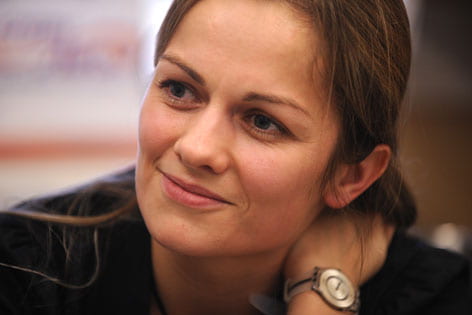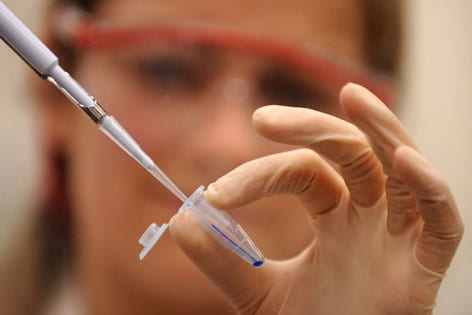Postdoctoral scholars in the spotlight
UC Irvine’s postdoctoral research staffers asked, “Where’s the love,” and the university responded, making February “Postdoc Appreciation Month.”
The 350 postdoctoral scholars who toil in labs from one end of the campus to the other are asking, “Where’s the love?” And the answer is coming from UC Irvine’s newly established Center for Graduate & Professional Students and Postdoctoral Scholars, which has designated February as “Postdoc Appreciation Month” – 28 days devoted to highlighting the important role staff scholars play in supporting the university’s research mission.
“This center and its programs are a great step forward at UCI,” says Susan V. Bryant, research vice chancellor. “It gives us a mechanism to draw postdocs together and focus on their concerns and connect them to the campus. We can’t do our jobs without postocs, and this is a way to recognize their contributions to the organization and provide training and networking that helps them get to the next step.”
Most postdocs recently received their doctorates and are in the final stages of preparation to become researchers and teachers in their chosen fields. At UCI, they conduct experiments on everything from the tiniest protein structures to the outer reaches of the universe. About 60 percent are hired from outside the U.S. and work for three years with top researchers before moving to universities or private sector careers.
“They provide full-time support and expertise for faculty-led research projects, they mentor graduate and undergraduate researchers, and because so many of them come from outside the U.S., they provide international perspectives in their research areas,” says William Zeller, who directs the new center for graduate students and postdocs.
Three postdocs profiled here illustrate the range of educational backgrounds, future goals and contributions to research at UCI.
SOLVING THE RNA RIDDLE: WHY GENES MALFUNCTION
Name: Yvonne Klaue
Department: Microbiology & molecular genetics
Research adviser: Klemens Hertel
Research focus: Alternative splicing
Education: Doctorate, molecular biology, Sainsbury Laboratory, Norwich, England.
Why I came to UCI: My husband got recruited to Irvine, and I was looking for a lab that does exciting RNA work.
Where I want to go from here: I’d like to get a more permanent job. I’m currently taking project management classes at UCI Extension and hope to get a job where I can combine my scientific knowledge with this area.
Family status: Married
Interesting fact about me: I grew up in East Germany and experienced the Berlin Wall coming down when I was 14.
Yvonne Klaue comes to work each day, puts on her white smock and safety goggles, retrieves her favorite pipette, and commences to get the “junk” out of genes.
From behind her radiation shield, she manipulates components of RNA — some of it called junk because it serves little purpose in genetic coding — to study why gene processes sometimes malfunction and cause disease.
“We know that some diseases, such as spinal muscular atrophy, are caused by the malfunction of splicing that occurs naturally,” Klaue says. “Once we understand how those malfunctions occur, then we can start working on how to stop it from happening.”
As complicated as that sounds, working with genes in the lab of Klemens Hertel, microbiology & molecular genetics assistant professor, is the easy part of being a postdoc at UC Irvine. More difficult is networking, sharing experiences and support, and organizing seminars with her fellow postdocs, Klaue says. She has worked closely with the Center for Graduate and Professional Students and Postdoctoral Scholars to help organize the February appreciation event and help eliminate the isolation some postdocs experience.
“We have postdocs here from a variety of cultures,” she says. “Some are married and some are not. We don’t live on campus; we’re scattered all over. So, the only common denominator is the work environment. It’s difficult just to get people together for a beer and pizza. We could have two postdocs in the same department and they wouldn’t even know each other.”
She has created a postdoc Facebook page in an attempt to remedy that. And she’s looking forward to more networking and professional support events.
“It’s important to network, both with other postdocs and non-postdocs,” she says. “Sometimes we tend to get focused only on the work.”
ATMOSPHERIC CHEMISTRY: STUDYING AIRBORNE SEA SALT
Name: Prasad Pokkunuri
Departments: Chemistry; mechanical & aerospace engineering
Research advisers: Barbara Finlayson-Pitts and Donald Dabdub
Research focus: I use computers to study the physics and chemistry of airborne particles.
Education: Doctorate, mechanical engineering, UC Riverside.
Why I came to UCI: I wanted to do interdisciplinary research that was different from my doctoral work.
Where I want to go from here: A national research laboratory
Family status: My parents are in India; they visit me now and then. I have a sister and brother-in-law in India.
Interesting fact about me: I am vegetarian and have never eaten meat or fish.
Prasad Pokkunuri likes to do two things at once – or three, or four. Multitasking is central to his postdoctoral work refining computer simulations of how airborne sea salt releases ozone-depleting chemicals.
“I like that it is not a simple process,” Pokkunuri says. “You have to know about a lot of areas, including chemistry, physics, mathematics and programming to do computer modeling.”
Pokkunuri works with AirUCI, UC Irvine’s atmospheric chemistry research group. Under Donald Dabdub and Barbara Finlayson-Pitts, he uses computers to reproduce results from laboratory experiments that track emissions of chlorine and bromine from sea-salt particles, which can influence ozone levels in Earth’s lower atmosphere.
“My work is increasingly relevant these days, with the heightened focus on the environment and climate,” Pokkunuri says.
Pokkunuri came to UCI in 2007 from UC Riverside, where he researched hydrogen combustion. AirUCI, he says, has allowed him to learn a different but related field, and is preparing him for his next career step – a position in a national research laboratory.
“UCI has a very active research community, which I think is an advantage to a postdoc,” Pokkunuri says. “We have a lot of seminars and frequent discussions about our research.”
He received his bachelor’s in India, his native country, before coming to the U.S. in 2002. He would like to work in Europe or Australia before returning to India, where his parents and younger sister live.
In his free time, Pokkunuri skis, runs, bikes and swims, and he is learning to surf.
MENTAL ILLNESS: TROLLING FOR A CURE
Name: Pedro Adolfo Sequeira, the Della Martin Fellow
Department: Department of Psychiatry & Human Behavior
Research advisers: Drs. William E. Bunney and Mark Vawter
Research focus: Molecular genetics approaches for the study of psychiatric disorders.
Education: I have a doctorate in human genetics from McGill University, and a master’s in neurosciences from University of Montreal.
Why I came to UCI: UCI has one of the most competitive and productive research groups in the field of molecular psychiatry with several major projects going on, such as a genome-wide genotyping project and a global gene expression profiling project in brains of deceased psychiatric patients.
Where I want to go from here: I would like to continue my line of research and develop new projects to study the genetics of psychiatric disorders, establish my own lab and collaborate with other researchers here.
Family status: Single
Interesting fact about me: I am a really good fisherman, and I completed a business degree at the same time I did my graduate studies.
Pedro Adolfo Sequeira sees many similarities between two of his passions, fishing and genetics.
“In fishing, you constantly have to experiment to find the best way to catch fish,” he says. “Trying to find the genes that are activated in people who have psychiatric disorders is very much the same. In a way, I’m fishing for genes.”
As the Della Martin Fellow in the Department of Psychiatry & Human Behavior, Sequeira uses the latest scientific techniques to scan for relevant genes from postmortem brain tissue of schizophrenic, depressed and bipolar subjects. His goal is to find the ones that were altered and contributed to the psychiatric illnesses and to suicidal behaviors.
It’s demanding, exacting work, but the payoff, he says, is that the expressed genes he discovers can become the targets for new and improved psychiatric treatments. Current ones for severe depression and schizophrenia do work, he adds, but not in all cases. Sometimes, they don’t work at all. He’s looking to change that.
Sequeria was born in Nicaragua and his family moved to Montreal when he was a child. He received his doctorate in human genetics from McGill University and a master’s in neurosciences from the University of Montreal. For the past three years, he has worked in the lab of Drs. William Bunney and Mark Vawter and oversees several major gene expression and genetic screening projects. With Bunney being a pioneer in the study of the molecular genetics of psychiatric disorders, his decision to come to UCI was a logical one.
Making the decision even easier, he says, is that the campus is so close to the Pacific Ocean, where the fishing is good.

